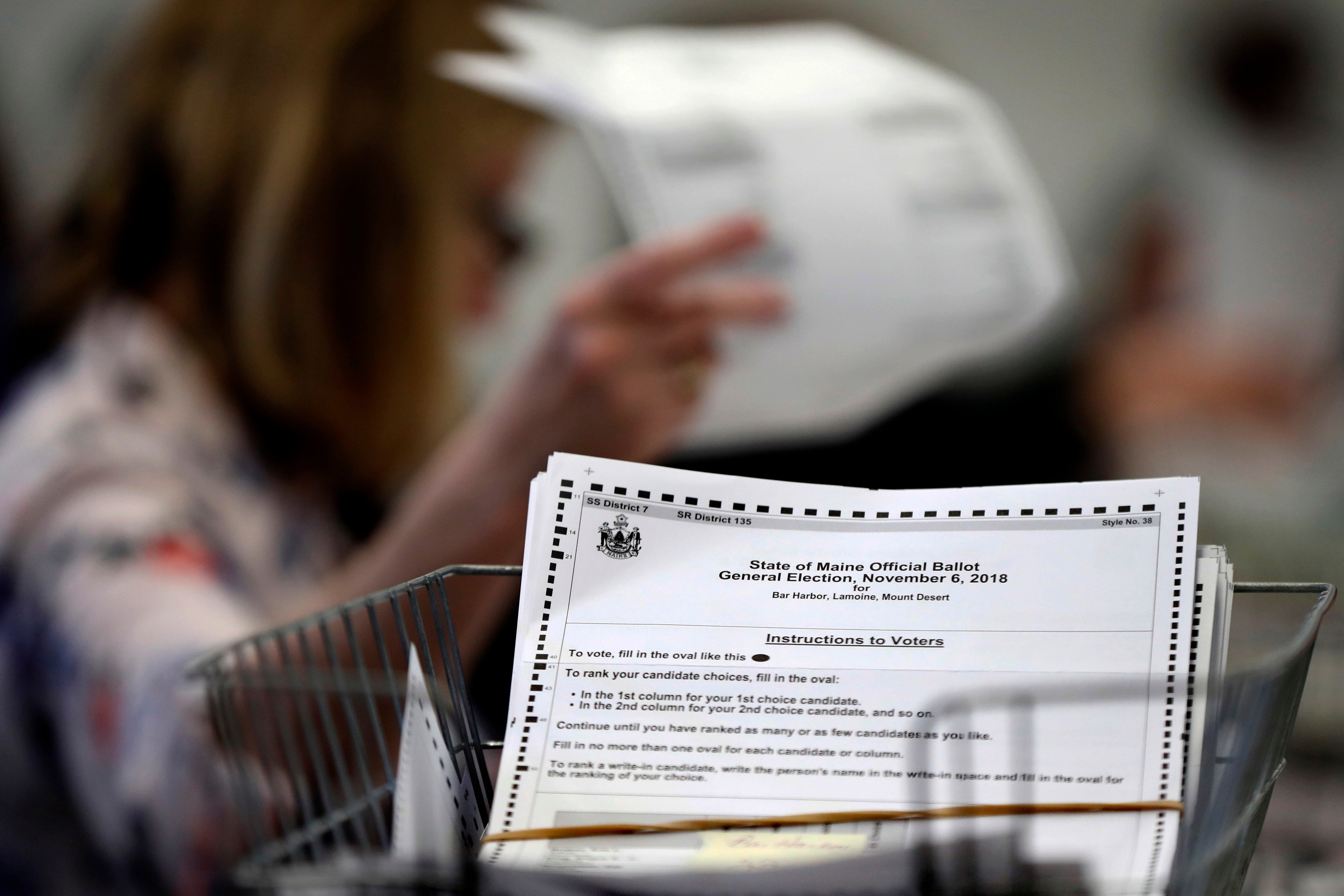Ranked choice voting in Maine a go for presidential election
A Maine Supreme Court decision means ranked choice voting will be used for the first time in a presidential race anywhere in the United States

Your support helps us to tell the story
From reproductive rights to climate change to Big Tech, The Independent is on the ground when the story is developing. Whether it's investigating the financials of Elon Musk's pro-Trump PAC or producing our latest documentary, 'The A Word', which shines a light on the American women fighting for reproductive rights, we know how important it is to parse out the facts from the messaging.
At such a critical moment in US history, we need reporters on the ground. Your donation allows us to keep sending journalists to speak to both sides of the story.
The Independent is trusted by Americans across the entire political spectrum. And unlike many other quality news outlets, we choose not to lock Americans out of our reporting and analysis with paywalls. We believe quality journalism should be available to everyone, paid for by those who can afford it.
Your support makes all the difference.Ranked choice voting will be used for the first time in a presidential race in the U.S. under a ruling Tuesday by the Maine Supreme Court, which concluded a GOP petition drive intended to stymie its use this November came up short.
The Supreme Judicial Court concluded that the Maine Republican Party failed to reach the threshold of signatures needed for a “People’s Veto” referendum aimed at rejecting a state law that expands ranked choice voting to the presidential election.
The GOP collected tens of thousands of signatures but came up shy of the needed level of 67,067 after some were invalidated.
The fast-paced, 11th-hour legal machinations followed the secretary of state’s rejection of the referendum. The Maine GOP appealed that decision and a state judge reinstated enough signatures to surpass the minimum by 22 signatures.
Another appeal took the matter to the state’s highest court, which issued its decision just six weeks before the election.
The issue before the state Supreme Court focused on a narrow question of whether signature gatherers must be registered to vote in the town where they are circulating petitions at the time they started. The Supreme Judicial Court ruled unanimously Tuesday that the requirements don't violate First Amendment rights of signature gatherers.
The combined number of signatures collected by the two individuals whose status was challenged were enough to sink the referendum.
Maine's ballots were already being printed in a grid format for ranking the candidates in the presidential race. The presidential ballot will feature five names, including Republican President Donald Trump and Democratic challenger Joe Biden.
Ranked voting will also be used in U.S. House races and the U.S. Senate race between Republican incumbent Susan Collins and Democrat Sara Gideon, the Maine House speaker.
Under the voting system, voters are allowed to rank all candidates on the ballot. If no one wins a majority of first-place votes, then there are additional tabulations, aided by computers, in which last-place finishers are eliminated and votes reallocated based on those supporters’ second-place choices.
That adds another wrinkle to the presidential contest in Maine, which already does things differently as one of two states that divide electoral votes.
In the last presidential election, Democrat Hillary Clinton won three electoral votes while Trump won one electoral vote in the 2nd Congressional District, underscoring political divisions between the state’s liberal, urban south and conservative north.
The ranked choice voting system, approved by Maine voters in 2016, has become a partisan issue in the state, where Republican U.S. Rep. Bruce Poliquin was ousted in 2018 despite collecting the most first-place votes.
Supporters say the voting system eliminates the impact of so-called “spoiler candidates” and produces a majority winner.
Critics say it’s unnecessarily complicated. They have also argued that it disenfranchises voters who don’t understand it.
The constitutionality of the voting system has been twice upheld by a federal judge in Maine. But ranked voting is not used in the governor’s race or legislative contests because it runs afoul of the Maine Constitution.
___
AP’s Advance Voting guide brings you the facts about voting early, by mail or absentee from each state: https://interactives.ap.org/advance-voting-2020/